Having defined company values not only benefits employee engagement and how employees interact with your organization but can influence if someone wants to support your business.
Your core company values shape the work environment and the business decisions your leadership teams will make.
And although the concept might sound like corporate jargon, the values defined by your organization shape how you build great teams, create great products or services, and deliver the best experience for customers.
So what is the importance of defining company values? What examples are out there that can help your organization? In this guide, you’ll learn all the in’s and out’s to giving your business a more meaningful purpose that everyone can support.
- Company Values Defined
- Importance of Company Values
- Company Values Statistics
- Examples of Common Values
- Companies with Excellent Company Values
- How to Define Your Company Values
- Communicating Company Core Values Today
- Digital Platforms Help Communicate Values
Company Values Defined
Think of your company values as your company’s DNA and what separates you from the competition in your space. Your values reflect your business beliefs, principles, and decisions that define who your company is. They influence employees, future hires, and relationships with customers, stakeholders, and business partners.
The business decisions your organization makes should all be guided by the values set forth at the highest level. That includes product or service innovation, whom your company chooses to hire or work with, the overall mission statement, and how you work with customers.
Often, organizations will talk about their core company values, but lack transparency with their people or even follow the values themselves. As the saying goes, practice what you preach!
And you bet that employees and customers can see through the facade if you aren’t actively practicing your own principles and genuinely caring about having strong and positive values.
Remember, each of your employees — from the intern to the CEO — should be aligned with the company values, workplace culture, and make decisions that will accurately meet and reflect those values.
Importance of Company Values
At this point already, you probably are getting a clear picture of why core values matter to your organization. But to truly understand the impact and influence, it’s important to dive a bit further into the data and more.
Besides differentiating your company from the competition, your company values truly influence everything at your company. For example:
- They guide how everyone communications internally and externally
- These values guide decisions by the business leaders and executives
- They help marketers create a brand and define their strategies better
- Helps sales better communicate and present products or services
- Influences customer service and client success on how to interact with customers
- Ensures employees are all on the same page to boost employee engagement, productivity, motivation, and efficiency
- Impacts product and innovation to focus on areas that improve results and business ROI
- Guides HR teams on shaping culture, employer brand, and recruiting efforts
- These values help you attract and retain customers with similar beliefs
And you can probably even think of other areas where defined business values will influence your organization. But you can see that this is why organizations spend a lot of time defining who they are, what they believe in, and creating a set of values.
Additionally, these core values can shift over time. Your organization may transition throughout the years, especially with remote work, the employee experience, and the digital transformation all influencing the workplace.
A few years back, Twilio CEO and Co-founder Jeff Lawson gave a speech about company values and why companies need to have a strong culture. It’s just over 30 minutes long, but definitely save it for later to watch if you can’t right now.
Company Values Statistics
As you read in the previous section, company values have a direct impact on your entire organization and if you have happy employees. From the examples of importance above, you should now understand that this is something your business should not take lightly.
However, let’s look at some company value statistics to the influence it has overall.
- 76% of employees believe that well-defined business goals help cultivate a positive work culture. (Bultin)
- More than 50% of CEOs and CFOs say corporate culture influences productivity, creativity, profitability, firm value, and growth rates. (Forbes)
- Companies with highly aligned cultures and innovation strategies see 30% higher enterprise value growth and 17% higher profit growth. (Achievers)
- In a survey, 26% of employees would forego a fancy title and 65% would accept lower pay before dealing with a poor workplace environment. (Harvard Business Review)
- Just 23% of U.S. employees strongly agree that they can apply their organization’s values to their work every day. (Gallup)
- 89% of HR leaders believe peer feedback and regular check-ins enhance their organizational culture. (Businesswire)
- Actively disengaged employees cause U.S. companies between $450 – $550 billion in lost productivity per year. (Zippia)
- 92% of employees agree that when they’re recognized for a specific action, they’re more likely to repeat it in the future. (Achievers)
- 35% of U.S. workers say they would pass on the perfect job if they felt the company culture wasn’t a good fit. (Robert Half)
- 93% of employees would stay at a company longer if it invested in their careers. (LinkedIn)
Examples of Common Company Values
No one company is alike when it comes to their core values and how they create culture. But almost every organization has overlapping themes that drive their business decisions.
Naturally, some organizations may pick and choose to focus on specific areas or dabble in them all. Either way, these areas are all redeeming examples of common company values that all businesses should strive to achieve.
- Integrity
- Boldness
- Honesty
- Trust
- Accountable
- Commitment to Customers
- Passion
- Fun
- Humility
- Continuous Learning
- Ownership
- Constant Improvement
- Leadership
- Diversity
- Innovation
- Quality
- Teamwork
- Simplicity
- Employee Development
- Discipline
- Empowerment
- Authenticity
Companies with Excellent Company Values
Besides the common themes used for company values above, what companies have some of the best values today? You might have a brand you love already, which is most likely tied to their core company values.
Adobe
The innovative tech company has been on the cutting edge of technology for years. Yet, Adobe has also put focus and emphasis on their culture and company values.
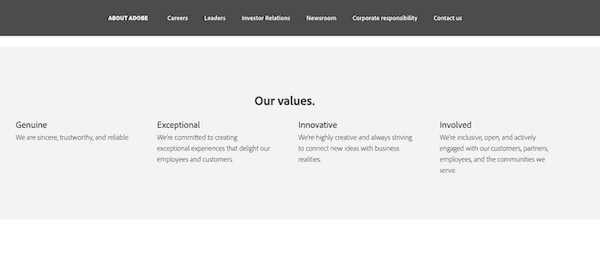
While their values are simple, they live and breathe by them. And it’s why you see so many engaged employees and customers sharing on social media about their love for the company.
Adobe also has been one of EveryoneSocial’s first customers and continues to be today many years later. We are inspired and proud to work with Adobe on their employee advocacy initiatives. Read our customer story with Adobe here.
Workday
Workday is an American financial management and human capital management software company, which was founded in 2005. And since then, the company has grown significantly.
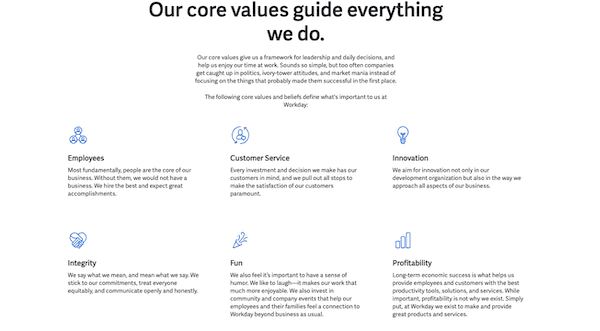
Additionally, Workday is another great customer of ours that we have gotten to work with over the last few years. We look forward to our continued partnership.
Zillow
The American online real estate marketplace company was founded in the mid-2000s and has since become the go-to website for finding homes. Yet, the company has also blossomed and now employs over 6,000 people!
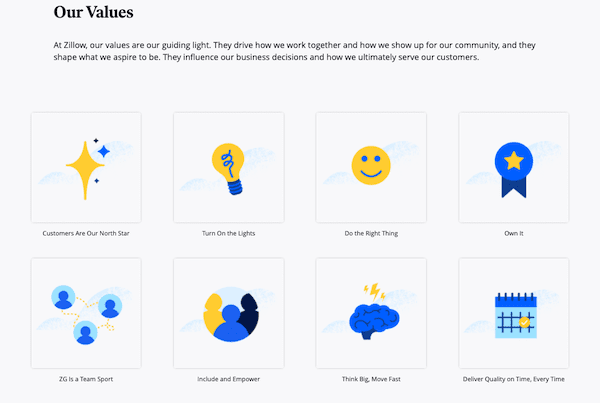
Airbnb
Over the years, Airbnb has become a top brand that people love. And even though they faced some recent hardships when the global pandemic hit the world, the brand continued to stick by its core values along with great leadership.
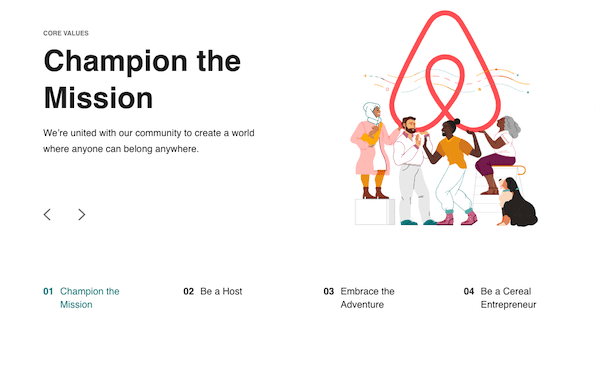
HubSpot
HubSpot’s marketing and sales software has become one of the most well-known names in the space. And over time, they have also focused on their work culture, diveristy & inclusion, as well as their core company values.
The Co-Founder and CTO Dharmesh Shah, put together a cool presentation all about their culture and values. You can view that presentation at the link below.
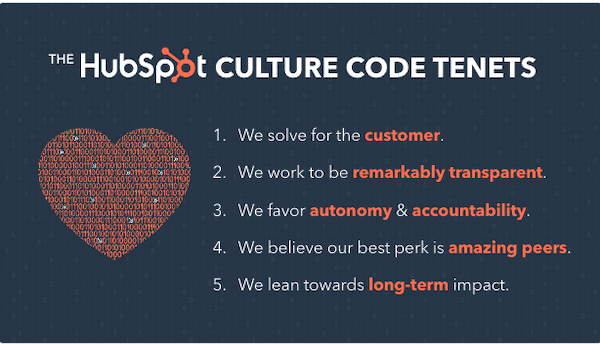
How to Define Your Company Values
So how does your organization define its own company values and maintain a culture of innovation? Although you might have values already, do they really illustrate what your company wants to represent to audiences? Is employee satisfaction the highest it can be?
And while a lot of effort might have gone in to define these in the past, do these values still hold true, or are they legit working?
It’s okay if the answer is unclear or a definitive “no.” Addressing and examining your company values can be done at any time, but you do want to put forth your best effort.
Here are some guidelines that can help you establish or update your company values:
- Keep it short and simple. Company values should be memorable and easy to adhere to. Nobody wants to read a book or get lost in corporate jargon. Use words from the examples above and things that are identifiable for the average person. There is no reason to complicate or confuse anyone.
- Have related goals for your values. Often, companies dance around how the company values relate to the company goals and mission. These values need to intertwine with everything your company does — from the product or services to your overall company culture.
- Incorporate values that empower employees. Your values must connect with your employees and be supportive in their professional careers, which help them continue to be successful. Encourage their feedback, ideas, knowledge sharing, and let them take ownership of their work. Doing this creates better communication, improves employee retention, and creates employee influencers.
- Put unique twists on your values. As you saw in the examples, there are tons of common themes and words that organizations will use. And while that might be the case, you can be creative and unique with your company values. Mimicking a competitor on values is not only obvious, but it looks like your organization didn’t put much thought into it. Being different and having your own company personality will help your organization attract the right customers and employees.
Communicating Company Core Values Today
One of the important aspects of distributing your company values is how you communicate this important information. You might have noticed I left this one off from the previous section. However, it’s because how you internally and externally communicate values is incredibly important.
Overall, your company values strategy has two parts:
- Defining your values
- Distributing your values
While defining your company culture and value can be challenging, communicating them effectively is another hurdle to overcome.
You should communicate these values with your employees and external stakeholders (investors, partners, customers), so everyone knows what they are and why they exist. This encourages everyone to be a part of your brand community and feel valued for their contributions.
How can you distribute these values and ensure everyone feels connected? Here are a few things to consider:
- Ensure executives are leading by example and living the core values every day
- Make sure the values are instilled in the hiring and onboarding process. That way from day one, future hires know what to expect. Plus, it helps hiring managers find the right people who align with the company values well.
- Ensure the core values are a focal point of your internal communications strategy. And no, a monthly newsletter with information and values is not enough.
- Use an employee advocacy platform to not only distribute news and information, but give everyone the ability to engage, provide feedback, create and share, and be recognized. Your company values will easily be distributed and shared no matter where employees are working.
- Recognize employees for their contributions and ensure it’s a clear company value so people feel engaged and want to go the extra mile.
- Although COVID-19 forced many organizations to work from home, the values can still apply in the office once employees may start returning to the office. Make sure your company values remain visible every day in the workplace.
Digital Platforms Help Communicate Values
The global pandemic of 2020 has changed the way organizations work and communicate with their employees. Yet, even prior to these historic times, core values and communication breakdowns were happening.
- 74% of employees feel they are missing out on company information and news.
- 72% of employees don’t have a full understanding of the company’s strategy. (IBM)
- 57% of employees report not being given clear directions and 69% of managers are not comfortable communicating with the employees in general. (HR Technologist)
However, the pandemic forced a large part of the world to quickly switch to remote work, while unfortunately layoffs and businesses also closed rapidly. Needless to say, trust and communication have been more important than ever before to foster a great workplace.
And since the world has drastically changed, it forced many organizations (probably yours included) to re-access company values and communications strategies. It’s important now that you take a look at how you can strengthen your core values and instill trust during a crisis as we saw in 2020.
This is why digital communications and platforms are more relevant than ever! There are certainly many tools and platforms to work with, but one that works well in employee advocacy platforms (I.E. EveryoneSocial for Comms).
Think of it as the central hub, where content, information, collaboration, community, and recognition can all happen — no matter where employees are currently working.
- Personalized content feeds
- Mobile apps and desktop application
- Email and push notifications, newsletters, in-app notifications
- Pin, highlight, scheduled, or mark important news or content
- Utilize gamification and leaderboards to drive engagement
- Community feed of employees, jobs titles, and contact info
It’s a great place for leaders to distribute relevant information and ensure core values are distributed and continued throughout the entire workforce.
Remember, an employee communications platform can be a game changer, but it won’t solve any communications or company value challenges without strategic planning.
Want expertly crafted content to help refine your marketing, social selling, and recruiting strategies? Sign up for our newsletter and get a copy of our Personal Brand Starter Kit. 👇















